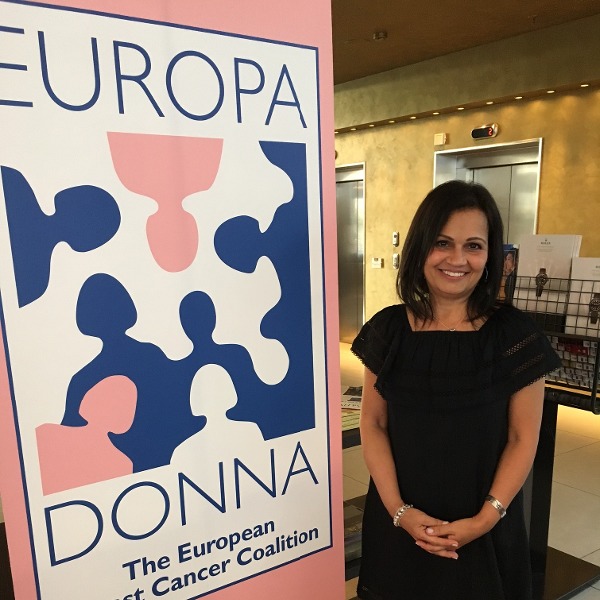This June I had the opportunity to attend the Europa Donna Metastatic Breast Cancer Advocacy Conference in Italy. The chair of our board, Cathy, was asked to speak and I was happy to join her to share with the group the advocacy that CBCN has been doing in Canada. While most of the participants that attended were representing various organizations, it was interesting learning that many of them were also women who were living with metastatic breast cancer.

Cathy, the Chair of CBCN, on the first day at Europa Donna's
Metastatic Breast Cancer Advocacy Conference
As everyone went around the room and introduced themselves, it was amazing to hear people’s personal stories and how metastatic breast cancer had impacted their life. Some had been diagnosed early stage and were then later diagnosed with metastatic breast cancer. Some were initially diagnosed with metastatic breast cancer. Some had been living with this disease for a short amount of time, some had been doing so for years. There were women of all ages, young women, older women, and everywhere in between.
What struck me the most was the openness and honesty of these women, talking about the impact that this disease had on them. I saw the true resilience of women, from different countries, different walks of life, who were facing this overwhelming reality and were looking it in the face and living their lives, more empowered to do so than ever before. It was inspiring and it was a powerful testament to their resilience.
I thought of all the women I knew back in Canada who too are facing this reality, this disease, and who are also living life to the fullest. Determined to deal with this disease on their terms and in their own way.
Over the course of the conference participants learned about breast cancer advocacy, how to share their story and move forward the issues faced by people living with metastatic breast cancer. As I reflected on this, I thought of the many women that CBCN has worked with over the years; raising awareness about the needs of patients and making sure that that Canadians can access the drugs that they need. And I thought of the work that still needs to be done and the importance of people living with metastatic breast cancer to share their stories, their voices. Which is one of the reason’s that CBCN is here, to help ensure that the voice of patients is heard, and considered. If you’re living with metastatic breast cancer and want to share your story, I would encourage you to connect with us and find out how you can get involved.
There are women all over the world living with metastatic breast cancer who are using their stories and their experiences to advocate for access to the best care. Don’t forget to add your voice!
Jenn is the Director of Education at CBCN and has worked with the organization for over 8 years. Her role has allowed her to work closely with patients and survivors to develop educational programs and resources to address a variety of breast cancer related topics and issues. Connect with Jenn directly at jgordon@cbcn.ca






